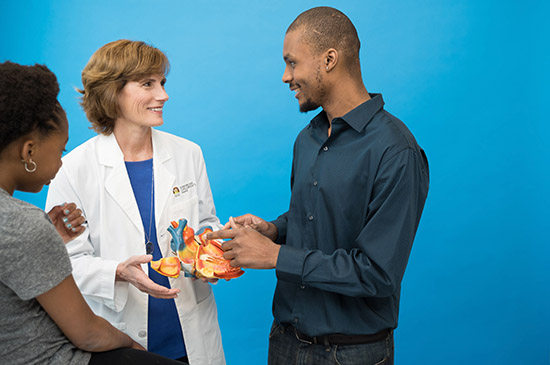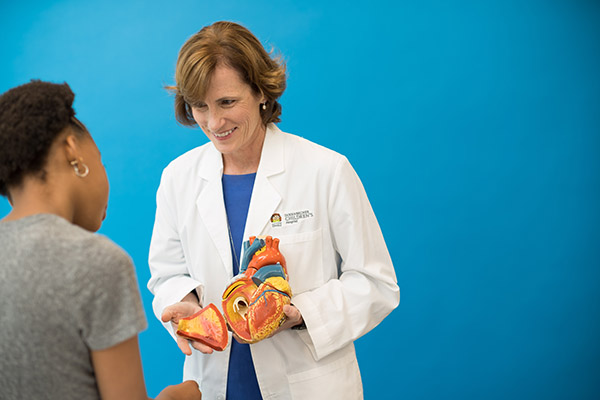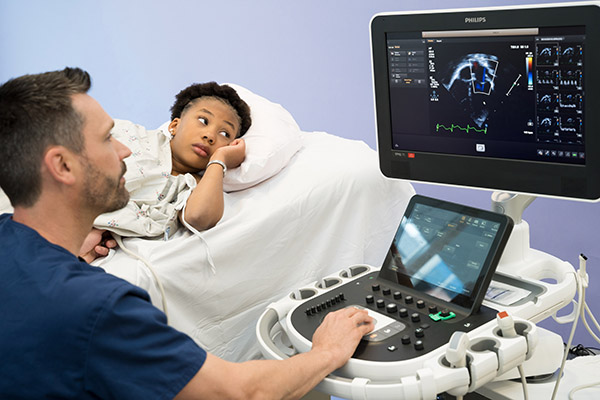Pediatric Heart Failure and Transplant Care

OHSU Doernbecher Children’s Hospital provides the most advanced care in Oregon and southwest Washington for children with heart failure or transplanted hearts. We partner closely with top transplant centers and provide expert before- and after-transplant care.
Our program includes:
- Critical-care doctors on duty 24/7 to care for children with failing hearts.
- Heart surgeons and interventional cardiologists (cardiologists with additional training in catheter-based care) with expertise in the latest techniques for treating complex heart conditions.
- Interventional cardiologists and anesthesiologists with expertise in heart biopsies.
- Designation as a Center of Excellence for lifesaving heart and lung support (ECMO).
- Partnerships with Stanford Children’s Health and Seattle Children’s Hospital for transplants and placement of heart assist devices.
- The region’s only team of pediatric heart specialists dedicated to post-transplant care. This helps children come home sooner, with proper monitoring.

What makes our program different
Doernbecher has the largest and most experienced team of children’s heart specialists in Oregon and southwest Washington. Our team-based approach means we work together and with experts across OHSU to give your child the best possible care, before and after a heart transplant.
Dr. Laurie Armsby, a specialist with advanced training in children’s heart conditions, cares for patients after heart transplantation. She completed advanced training as an interventional cardiologist. She spent more than a decade of her career at Boston Children’s Hospital, a top heart transplant center.
Dr. Armsby works closely with physician assistant Ali Lyman, who also has years of experience caring for children after heart transplantation.
Your child’s heart care team may also include:
- Children’s heart doctors (pediatric cardiologists)
- Children’s heart surgeons
- Critical-care doctors
- Nurses
- Physician assistants
- Imaging specialists (radiologists)
- Dietitians
- Social workers and psychologists
- Physical and occupational therapists
Heart failure care
When a child has heart failure, the heart becomes weak. The heart is unable to work well, even with medication. It has trouble pumping blood through the body. This condition can range from mild to severe, and it can worsen over time.
Our goal is to slow the progress and postpone the need for a heart transplant as long as possible. We offer the latest treatments in a child-friendly environment.
Heart failure types
Patients with heart failure often fall into these categories:
- Children with structural heart defects caused by congenital heart conditions. After a series of surgeries, their heart muscles can become scarred, losing the ability to pump.
- Children with acquired heart conditions that develop after birth, such as dilated cardiomyopathy. In these children, the heart becomes enlarged and weak. Viruses also can damage the heart muscle in older children and adults. Sometimes a heart condition that develops after birth has a genetic cause.

Diagnosing and treating heart failure
Your child’s care may include:
Tests: We use both standard and innovative diagnostic tests to evaluate and monitor your child’s condition. They may include:
- Electrocardiogram
- Echocardiogram
- Cardiac catheterization
- Cardiac MRI (magnetic resonance imaging)
- Cardiac CT scan
- Genetic testing
Medications: Certain medications can help your child’s heart beat more strongly and efficiently.
Intensive care: Our Pediatric Intensive Care Unit (PICU) provides expert critical care for children with severe heart failure.
Heart catheterization: Our catheterization specialists and electrophysiologists are experts in using this minimally invasive option to:
- Evaluate heart failure by measuring the pressure and blood flow in the heart and lungs.
- Repair some defects and arrhythmias that can lead to heart failure.
- Obtain biopsies (removing a small tissue sample) to make sure a transplanted heart is working well.
Surgery: Our two children’s heart surgeons often work together in the operating room, sharing expertise to give your child the best possible care.
Transfer to a heart transplant center: No center in Oregon transplants children’s hearts or places ventricular assist devices (VADs) in children waiting for a transplant. If your child has advanced heart failure, we will help you transfer to a transplant program.

Care after a transplant
Doernbecher is the only hospital in Oregon and southwest Washington with a team dedicated to caring for children after a heart transplant.
Our care dovetails with the nationally renowned transplant programs at Stanford Children’s Health and Seattle Children’s Hospital.
- We coordinate care for each child with their transplant teams. Teams from both hospitals communicate often and work extremely well together.
- Stanford doctors visit Doernbecher regularly to follow up on post-transplant care.
- Other follow-up care includes monitoring, nutrition services and our providers’ specialized expertise for these patients.
For families
Call 503-346-0640 to:
- Request an appointment.
- Seek a second opinion.
- Ask questions.
Locations
Parking is free for patients and their visitors.
Doernbecher Children’s Hospital
700 S.W. Campus Drive
Portland, OR 97239
Map and directions
Find other locations across Oregon and in southwest Washington.
Refer a patient
- Refer your patient to OHSU Doernbecher.
- Call 503-346-0644 to seek provider-to-provider advice.
‘Thankful to be alive’
Meet Ethan Ellis, who was born with hypoplastic left heart syndrome and has had nearly lifelong care at Doernbecher. He was excited to take part in our Freestyle program.
A new heart for Kirsten
Kirsten Brown and her parents are grateful for the care at Doernbecher before and after her heart transplant. Doernbecher “treated the entire family,” her dad says. Kirsten also got to “make a really cool shoe” as part of our Freestyle program.